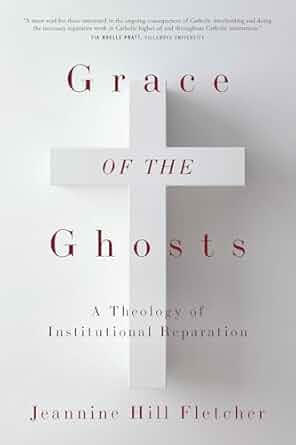Jesuit Fr. Timothy Kesicki, president of the Jesuit Conference of Canada and the United States, speaks at an April 18, 2017, "Liturgy of Remembrance, Contrition and Hope" in Gaston Hall on the campus of Georgetown University in Washington. (CNS/Catholic Standard/Jaclyn Lippelmann)
Fordham University theology professor Jeannine Hill Fletcher has come up with a compelling metaphor to capture the essence of her new book, Grace of the Ghosts: A Theology of Institutional Reparation.
The "ghosts" Hill Fletcher speaks of are the near forgotten non-white actors in mid-19th and early 20th century America who struggled to keep their faith alive while coping with the racism and white supremacist attitudes of political, social and clerical leaders.
The "grace" the author refers to are the opportunities for healing and reconciliation inherent in unearthing the stories of Black, Indigenous, Asian and Latinx peoples who in their own way resisted the dehumanizing impact of white supremacy.

Hill Fletcher is on solid ground with her latest effort. Grace of the Ghosts is a provocative follow-up to her 2017 book, The Sin of White Supremacy, in which the author defines white supremacy as an ideology rationalizing the material dispossession of non-white people.
The author refers frequently to "capital" — social, economic, symbolic, political and spiritual — that was withheld from racialized non-white peoples, thus relegating many to second-class status as the colonizing mindset (or "Doctrine of Discovery") swept through North America.
"The ghosts are those people who have been written out of our Catholic histories, but whose lives bore the pain of white supremacist thought, action, exclusions and legislation," Hill Fletcher said in an interview. "I am inviting us to encounter the ghosts in our particular histories, with the vision that the God of life who seeks peace and reconciliation for all people, could be working through the painful encounter with the truth the ghosts bring. And that through reckoning with our histories, we would begin the process of repair."
Facing difficult truths about history is part of a mature Catholic faith.
To be sure, Grace of the Ghosts is a challenging, if occasionally disturbing, read. Traditional Catholic readers might take umbrage at the suggestion that even Catholic missionary and evangelization efforts in the 19th century enabled some white supremacist attitudes to take root and flourish. This was especially true in the case of Catholic religious orders, particularly the Jesuits, who owned slaves and exploited their unpaid labor and economic value to establish seminaries and universities.
Georgetown University in Washington, and Fordham University in New York were the most prominent of these institutions to benefit from the slave trade.
Georgetown in 2017 acknowledged the university in 1838 sold 272 women, children and men into slavery for financial gain. The university has renamed buildings and implemented programs to identify the enslaved people and support their descendants.
Fordham also has implemented programs to grapple with its ties to enslavement.
As Hill Fletcher notes in a chapter provocatively titled "Complexity of a Complicit Church," "an economy of enslavement fueled the establishment and foundations of the church in the Americas …. [and] the first Catholic (and Jesuit) institution of Georgetown provided an entry point into Catholic complexity in this evil."
One weakness of the book is the author's habit of reiterating a handful of key points dozens of times. Particularly sensitive readers might be tempted to cry "mea maxima culpa" at the end of each paragraph.
However, given Hill Fletcher's sense of sorrow over the justice denied in American history, perhaps urgency and repetition can be regarded as effective rhetorical devices.
Advertisement
Hill Fletcher suggests Catholic institutions, especially universities, can take the lead in examining their individual histories as the first step in truth telling and atonement. In this sense, institutional reparation can become spiritual, not just material.
"In the tangled agonism of church commitments and state interests, Catholic institutions might [take] a theological path that insists on naming our past sins of White supremacy in the confession that is crucial to religious instruction in the faith," Hill Fletcher writes. "Catholic educators, administrators, families, and congregations can mobilize around the practice of truth telling and analysis of the United States as a culture of racism as foundational to Catholic practices of loving God and loving neighbor. Truth telling about history is essential to the structure of our worship when we open with a penitential rite seeking forgiveness in the expression of a general confession of sinfulness."
Efforts to uncover the truth, however, could be obstructed by a determined pushback by opinion leaders fed up with a growing demand to confess sins they don't believe they have committed.
In response, Hill Fletcher reminds readers that facing difficult truths about history is part of a mature Catholic faith.
"The original use of the term 'woke' meant staying alert to the pervasive powers of white supremacy and the death-dealing it creates," Hill Fletcher says. "Anti-woke, then, prefers to sleepwalk amidst the interpersonal and institutional forms of white supremacy that continue to deal death. The liberationist lens of Catholic Christianity insists that we stay awake to the injustices of our world, and that we read the signs of the times, with a particular concern for the least powerful — the preferential option for the poor."
In a concluding chapter offering advice to confront a culture of white supremacy, Hill Fletcher cites imitation of Jesuit founder Ignatius of Loyola and his Spiritual Exercises as one path to a meaningful examination of conscience for individuals at Catholic institutions to weigh their complicity in white supremacy. While this can be difficult and prone to evasive rationalization, the author suggests it can also be transformative.
"The weight of truth-telling about the sins of white supremacy is a terrible burden to bear, but we each must carry our portion of that weight in the struggle to shift it toward an otherwise possibility," Hill Fletcher writes. "And in carrying the weight and in shifting the weight of the world, we become Jesus followers with the work that we do … we might tap into Christian spiritual capital, aligned with the multiracial, multireligious opportunities to step into and create the otherwise possibilities of a more just world."





